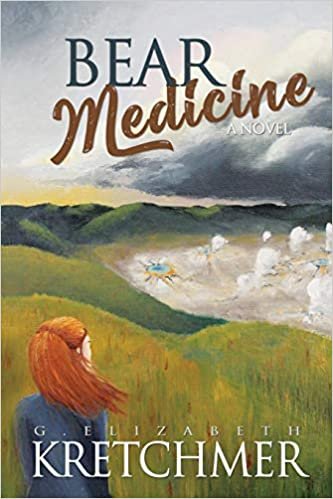Book Review: Bear Medicine
Bear Medicine. G. Elizabeth Kretchmer. Dancing Seeds Press, October 15, 2017, Trade Paperback and Kindle, 318 pages.
Reviewed by Deb Lecos.
In Bear Medicine, Elizabeth Kretchmer has written two vibrant and poetic side-by-side stories of women from different time periods who have lost contact with their inner wisdom and the power to pursue lives not controlled by marriage vows. Both Anne, a traveler from the 1800s, lost in the wild after a group of Nez Perez (Nimi’piuu) American Indians separate her from an abusive husband, and Brooke, a vacationing marathon runner mauled by a grizzly bear, are forced to face their weaknesses in Yellowstone National Park.
Anne, a city girl from Chicago, is woefully without the skills to survive beyond a few hours in the wilderness.
Thankfully, a young Native American woman calling herself Maggie is nearby, having lost her daughter and husband in the Nez Perez tribe’s mass exodus north. It is left up to Maggie to school “stupid Anne” in how to forage for food and shelter, break down animal carcasses, swim, build a teepee, and ride a horse. The pair face the hardship of survival in the vast, uncultivated land together, friendship blooming as they distance themselves from prejudice, and learn to claim lives of their own.
Over two hundred years later, Brooke must overcome injuries sustained in a bear attack, the wounds grievous enough to require convalescence away from a college-age son, daughter, and a controlling husband who has remained behind in Portland, Oregon. Brooke is sketched similar to Anne, child-like in the ways of caring for oneself; life before Brook’s injuries never having pushed her into the healing endurance that has now become an unforeseen necessity.
Bringing the two timelines together, Kretchmer introduces us to Leila, whose ancestors connect back to Maggie, the American Indian girl who took in the helpless traveler in the middle of the wilderness. Leila is the owner and caretaker of a property willed to her, land devoted to giving women sanctuary and the ability to discover their truth. In 1877, Anne and Maggie, along with Clara, a lonely homesteader, and Evalene, a medicinal healer, had realized women needed time and space to recover wounds of the body, mind, and spirit. It is at this same historical site those women built that Brooke is introduced to true companionship with another woman, as Anne and Maggie had many years prior.
There are several additional creative and well-written characters in Bear Medicine. In 1877, Sam, a freed slave, compassionately deeds a parcel of land to Maggie to create a safe home for herself and future women. Present-day Palmer is the park ranger struggling with bi-polar disorder who rescues Brooke after the bear attack, and Delaney, the distant daughter of Brooke, reminds her mother we are each free to choose our life circumstances. Yellowstone National Park comes alive as a backdrop and source of inspiration, while the great Grizzly Bear is a symbolic totem throughout the novel. This protective and powerful animal is a spirit guide (wyakin) for both Brooke and Anne, two women in need of a bear’s strength to break away from the confinement of their trappings and construct existences that are sustainable, worthwhile, and fulfilling.
The author offers a reader the opportunity for self-reflection, using the fictional experiences of women with a hundred and forty years between them to find similarities in the struggles, hopes, and lives of all women. Throughout history, women have had to endure the infliction of harm by men who use the institution of marriage and rules of governance to force subservience to a male-dominated viewpoint. Perhaps, with the rise of #MeToo created by Tarana Burke as an inspiration for black women to empower themselves after rape and recently adopted by women who have survived harassment, abuse, and sexual assault, the portal has finally opened that will demolish patriarchal hierarchy.
Bear Medicine shares what happens when people are unthinking, unkind, and use power as a means to control the lives of others and the healing that can arrive when we support one another. Kretchmer writes “from where the sun now rises we will fight forever.” It is a rallying cry for those believing in humane co-existence with all life on this planet. I welcome this teaching. May it inspire everyone across this beautiful rock floating in the middle of the awesome breadth of the universe to do better—both as living beings, and as caretakers of the Earth.

